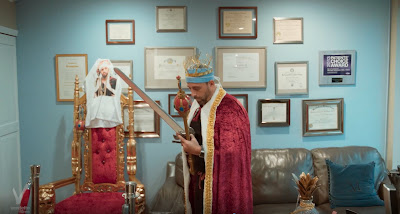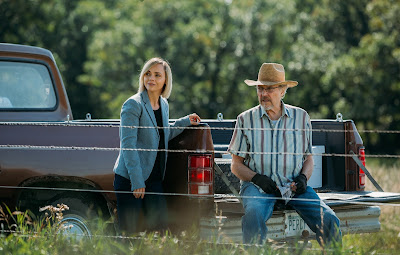Set in Ireland during the mid-'90s, two teenagers, Eddie and Amber, fake a relationship in order to stop everyone from speculating about their sexuality.
With so many LGBT+ films being released in recent times it's easy to switch off, to end up focusing on the similarities rather than focusing on the differences, and losing interest in an entire genre of brilliant films, simply because of an oversaturation of the market. The reality is that the historical repression of LGBT+ has had some devastating consequences on the mental health of the LGBT+ community over the decades, and this deluge of films for that specific demographic is pivotal in changing that trend.
That all being said, films can't just base themselves around LGBT characters or LGBT issues and consider themselves successes. It's an issue with Hollywood simply adding LGBT characters or genderbending for the sake of capitalizing on the "woke" culture and greater acceptance of the community to try and make more money through adding token characters whose personality only consists of "I am not straight", with no connection or relevance to the narrative.
None of this is a concern when it comes to Dating Amber. Semi-autobiographical for director David Freyne, the flick is based around two non-straight protagonists, deeply in the closet, but still bullied and picked on. Fitting into both the coming-of-age and coming-out genres, the entire film revolves around Eddie and Amber as they deal with the concept of exploring their sexuality through the oppressive framing of societal pressures.
Set in mid-'90s Ireland, it's an important distinction to note that this is set immediately after divorce and homosexuality have been legalized. No longer considered a crime, but still widely chastised with generations of bigotry and learned behaviours that society has engrained. A world where words like "lezzer" and "fagg*t" are thrown around with the intent of causing hurt and isolation, and anything short of a happy marriage between a man and a woman is treated like a disease.
Freyne navigates this world with a sense of sensitivity towards both homosexual and heterosexual sides. With a surprisingly unbiased perspective. Displaying differing behaviours and differing responses without a sense of judgement to any of them, leaving the audience to make their own minds up as to what is acceptable or unacceptable behaviour. Main protagonists make poor decisions, and minor supporting characters can make wholesome decisions. It's not the black-and-white that Freyne is interested in portraying. It is the various shades of grey; exploring the options that were open for dealing with a hostile work, home, and school environment. An analysis into the potential effects of each option; a learning module of sorts for those in a similar situation, coming from someone who has survived it themselves.
Dating Amber is split quite decidedly into three different acts. The first act is the fun, quirky portion that endears you to the protagonists and creates those initial emotional bonds between Eddie and the audience. The naivety and innocence in his appearance and mannerisms create a need to protect him and quickly generate empathy and sympathy towards the character. The musical compositions and cinematography come together to create an almost slapstick comedy that is guaranteed to bring in laughs and put smiles on your face. The humour is blue enough and portrayed with such nonchalance that it effectively stands out.
It is this well-executed character development in the first act that makes the rest of the film work as the whimsical nature of the first act makes way for the darker acts that follow. As events change, the Dating Amber loses most of its comedy preface for a more dramatic act with impactful gravitas, until it reaches a breaking point and the final act deals with the consequences of accepting or denying oneself. Conformity versus individuality. Defiance versus submission.
Dating Amber is a soul-searching plight for freedom and acceptance that effectively gets you hooked on a light-hearted introduction and holds you through the turbulent aftermath. There are certainly secondary plots that don't complete their arc, many characters are one-dimensional, and Amber's arc is marginalized when compared to that of Eddie, but Dating Amber gets more right than it does wrong.
Dating Amber is in cinemas from July 8, 2021
Originally posted to: https://djin.nz/Kr8886







































